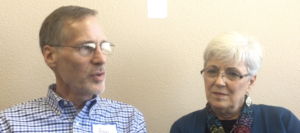Do you believe God still “calls” people and congregations to accomplish his kingdom business? Like he called Moses and Israel to find the Promised Land? Like Jesus called Peter and the other Apostles to follow him? Like Paul and the Antioch Church was called to reach the Gentiles?
The whole idea of “calling” is difficult for a heritage (like ours) that largely relegates God’s voice and intervention to the misty realms of times-past. Without a theology (or experience) of the Holy Spirit, “calling” devolves largely to reading the New Testament and trying to make application to the Christian walk today.
But what if God still “calls” people and congregations? What if he has a “will” for you and your church that he wants to communicate to you? Wouldn’t you want to hear and respond his call? Wouldn’t that be exciting?
We’ve already addressed the idea of “calling” in the lives of ministers and their work. But we are convinced that God also calls churches, that he has a mission for each congregation that is as significant as the call he issued to churches past and as fresh as today’s headlines. The call is general (in that all churches are called to accomplish a few, core functions faithfully) and specific (in that each church is called to do the “one thing” God has equipped and positioned it to do best).
Calling All Churches
There has always been a core of religious “business” for which God has made his people responsible —in every age; seven core functions every church must address in order to be the church.
The first two functions remind us that we are called to live vertically, to “reach up.” The church reaches up through worship and holy living to commune with God. In worship, we adore him. In holiness, we dedicate our lives to him.
God’s people are called to worship.
A regular recognition of the vertical dimension of our lives—so foreign to the flat and spiritually-oblivious world in which we exist—is a key function for the people of God. God wants his church to look up. He demands regular, emotive, God-honoring and life-changing worship whereby we acknowledge that God is on his throne and we are at his feet.
God’s people are called to be holy.
It is easy to confuse holiness with ethical living, doing the right things, avoiding sin. But holiness is bigger than that. Holiness involves developing a taste for God, a hunger for righteousness. It involves the notion of separating ourselves for—dedicating ourselves to—godly living. It implies an active pursuit of godliness motivated by spiritual passion and distaste for the sinful and profane. When God’s people take holiness seriously, we please our holy God and open ourselves to his blessings. When we grow casual about holiness, we demonstrate through careless living a careless disregard for him.
The next two functions remind us that we are also called to live horizontally, to “reach in.” God’s people are called to love each other and grow each other up in Christ.
God’s people are called to be a loving community.
In a world characterized by loneliness, isolation, and self-centeredness, God’s people provide a striking contrast. At least they should. We are call to be intimate communities, bound together by common faith and common blood. We are to love each other, live in harmony together, forgive, encourage and serve, lay down our lives for each other, share our possessions. We belong to each other in many and profound ways.
God’s people are called to mature each other.
We (all of us) are called to make disciples. Not just converts or clueless clones of ourselves. People who are trained and equipped for life in the kingdom. People who grow up to look like Christ. When the church attends to this business, people are grown into the image of Christ, and the future of God’s community is protected. When this function is ignored, God’s people struggle and falter.
The final three functions remind us that we are called to live in the world and for the world, that there is a “reach out” dimension to the church. Through service, we minister to the world’s hurts. Through witness, we testify to the world’s Savior. And by being “salt and light,” we dare to make a difference in this present darkness.
God’s people are called to serve.
God has always expected his church to be an outpost of compassion, caring for the needs of others, and pouring itself out in service. When we engage in selfless ministry, we partake in both the nature and the work of our Lord.
God’s people are called to witness.
We are called to bear witness. Jesus (who defined his own ministry in terms of “seeking and saving the lost”), commissioned his church to “go into all the world.” The early church turned the world upside down with its vigorous testimony to the life, death and resurrection of Jesus. We can do no less.
God’s people are called to influence their world.
Finally, the church is called to be “salt and light,” to share Christ’s lifestyle through example, confrontation, and persistent teaching. Sometimes our contact with the world has little to do with bringing people to faith, or alleviating needs, and much to do with making life in the world more palatable.
When a church today pursues effective worship, holy living, intimate community, intentional maturation, sacrificial service, powerful witness, and substantive influence, it is pursuing the essential business of the kingdom. It is responding faithfully to the general call of God to all churches at all times in every place.
To ignore any one of these impoverishes the church and disregards a mandate from our Head. God calls his people to function in each of these areas. There are no options where this essential business is concerned. You cannot take some of it and leave the rest. A healthy church will address each function thoughtfully, creatively, and effectively.
[This article was based on A Church that Flies, by Tim Woodroof. Leafwood Publishers.]





Leave a Reply